QuestionHi Nicole,
My adult redwag platy has recently seemed rather stressed, and I'm not too sure what i can do to help her de-stress. Her other platy roomies seem to be doing just fine. She still eats, but prefers to float at the bottom with her fins clamped shut. Her fins only open up when it's eating time, and even then it's not fully opened like before. It's been about 4 days now=(
She was bullied by a silver molly, but i removed all the mollies that so none of the other fish will get stressed. I also did a 50% water change, and removed some of the plants that may be taking up too much room, giving more swimming space. I also added some salt.
I have a 10 gallon tank with a heater and filter. The substrate is a mix of light coral stone and dark gravel. Water temperature is sitting at about 70F/27C. The fish's diet is dried brine shrimp, flake food, and dried worms. There is also some java moss for them to nibble on. Her roomies include 4 guppies and 2 platies.
AnswerHi Judy,
Well, the water change was a good call, since when something seems "off" with your fish, a water change never hurts - and often helps! If you have a test kit, it is also a good idea to test your water. Ammonia and nitrites must be 0 ppm - in a healthy, cycled tank, this is always so. If any of these levels register, assume this is the problem and keep doing 50% water changes every other day. Eventually, these levels will become 0 ppm if they are not so already. Nitrates (with an A) can be as high as 20 ppm, but they should not be higher than this. Water changes are also key to diluting high nitrates.
The one thing that strikes me about your temperature is that it is either too cold or a bit too warm...your conversion is off. If it was 70 Fahrenheit, then that's too cold, 75 degrees is the minimum temperature for this species. If it was 27 Celsius, then that's a little too warm - that's 80 degrees, and should preferably be a tad cooler, like 78F/26C. This is the simplest converter I have found:
http://www.wbuf.noaa.gov/tempfc.htm
In any case, make sure the temperature is between 75-78F or 24-26C. While platys can stand it warmer than this for periods of time, for the temperature to be above 78 degrees permanently is going to "burn them out" faster. If for whatever reason the water temperature is going to be this warm for a while (a heat wave, etc.) then extra aeration or water circulation should be added to compensate, such as an airstone at the bottom of the tank or a powerhead at the surface.
While you are right, that clamped fins are usually a sign of unhappiness in fish, there's no reason to medicate or do anything drastic for now. Just keep the water extra clean, keep an eye on her to make sure she doesn't develop ich, and try feeding her special foods such as frozen bloodworms. If she is looking swollen, she may be gravid (carrying fry) but she also may be constipated, which is a common complaint with livebearers. Feed her a shelled, cooked pea (such as a canned or frozen unsalted pea) and see if she nibbles at this from the bottom. You can read more here about livebearers:
http://www.wetwebmedia.com/FWSubWebIndex/poeciliids.htm
They all share similar needs: hard and alkaline water preference, and partiality to green foods in the diet such as Spirulina flake and algae wafers. Some vegetables may also be relished!
Hopefully your platy will feel better soon. If she seems to get bloaty and has trouble staying down, try Epsom salt (magnesium sulfate, not sodium chloride) at a concentration of 1/4 teaspoon per gallon. This helps with swelling, so is a helpful remedy for bloat or popeye, which is fluid retention in the eye...just FYI.
As for the salt you are putting in the tank, guppies do appreciate salt, and 99% of mollies do much better in salty water, but platys do not seem to need the salt. It really is not necessary to regularly add tonic salt to the water in your 10 gallon tank. Mollies love salt, but marine salt is the kind of salt to use because it buffers the pH, helping the water to become harder and more alkaline - just the way a molly loves! If your water is hard and alkaline already (pH of over 7, alkalinity registering as "high" on a test kit) then you can get away with just adding plain old salt (aquarium salt, kosher salt, sea salt...it's all just non-iodized cooking salt, really) to a molly tank. However, if your tap water has a pH under 7, and the alkalinity is low, then marine salt mix is going to be what your mollies and guppies will appreciate the most. Since you keep mollies too, you should have a read of this article also, which makes a case for keeping mollies in brackish water, where they are kept healthiest:
http://www.wetwebmedia.com/FWSubWebIndex/mollies.htm
In conclusion, keep a close eye on that platy, and feel free to let me know if any other symptoms appear. Do test the water sometime to ensure that ammonia and nitrites are 0 ppm, and also to determine the chemistry of your water, since livebearers have a need for water that is hard and alkaline...or at least, water that's NOT soft and acidic.
I hope that helps. Take care!
Nicole

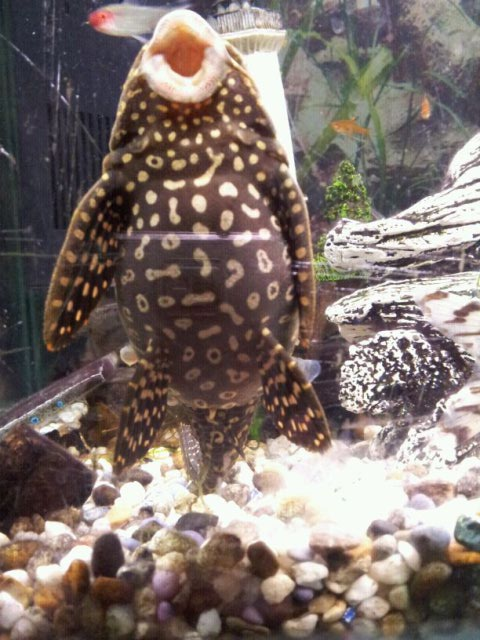 Bloated Pleco; Bubbley skin
QuestionPleco
Pleco
QUESTION: My Common P
Bloated Pleco; Bubbley skin
QuestionPleco
Pleco
QUESTION: My Common P
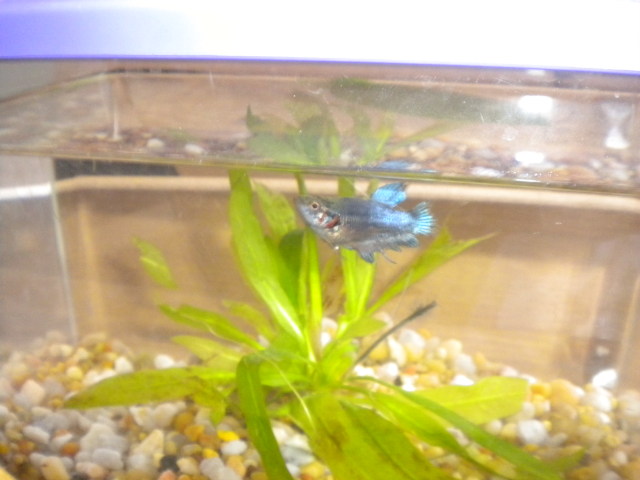 my betta...
Question
sapphira- female betta
MY female betta is swol
my betta...
Question
sapphira- female betta
MY female betta is swol
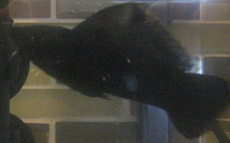 Setting up a brackish tank
QuestionSailfin Molly?
QUESTION: Hi Renee,
You
Setting up a brackish tank
QuestionSailfin Molly?
QUESTION: Hi Renee,
You
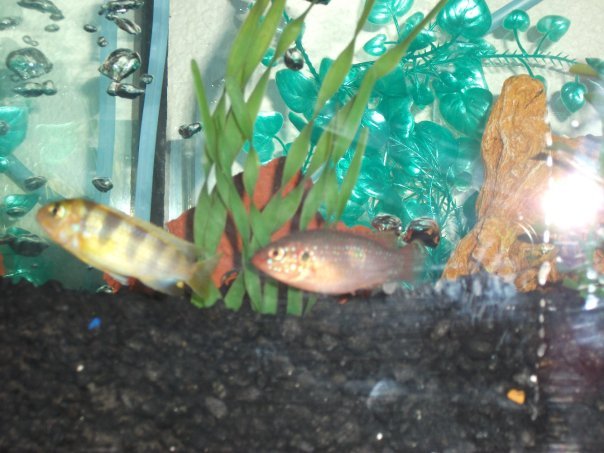 Identifying a fish
Question
Unknown cichlid
Richard, I have searched and s
Identifying a fish
Question
Unknown cichlid
Richard, I have searched and s
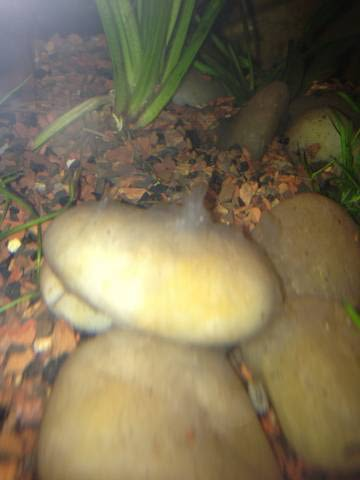 white fuzz on aquarium stones
Question
Fuzz
Hi Jaymie, I recently set up a Hag
white fuzz on aquarium stones
Question
Fuzz
Hi Jaymie, I recently set up a Hag